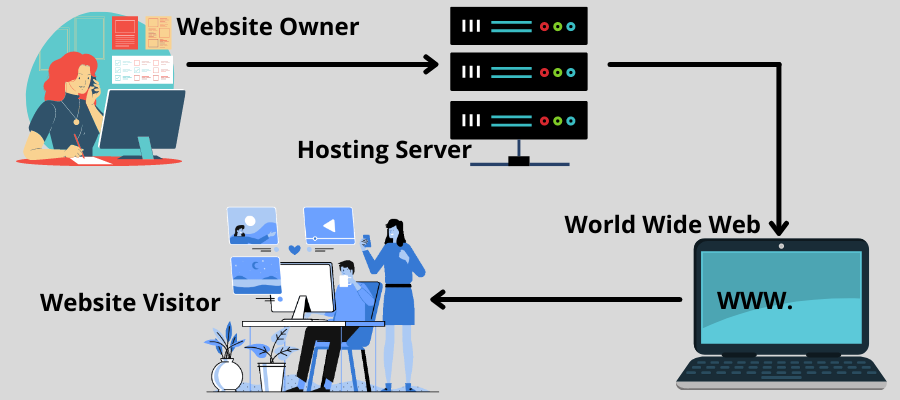Having a website for your business is essential, no matter how small or big it is. Even if you have a physical store, bringing your business online comes with incredible benefits by showcasing your products/services globally.
That said, creating a website requires a web hosting service. So, if you have made up your mind to build a website, the first thing that you may think about is – which web host to choose – as options are plenty in the market.
But why is choosing a web hosting service a big deal anyway?
It’s because web hosting forms the basis of what type of site you build, how good its performance is, whether it’s secure or not, and related stuff important for a successful website.
Hence, it’s pertinent to understand all about web hosting before you choose one. In this article, I’ll introduce you to the world of web hosting, its types, and what good options you have for each type to help you choose a suitable one for your business.
So, why wait? Let’s jump in!
What is Web Hosting?

Web hosting is a kind of internet hosting service, allowing businesses or individuals to make their websites online and accessible through the internet.
Simply put, every website requires a web host to rent a place on the internet that can store all your site’s information and make it live. And companies offering web hosting services are called web hosts that provide web space on a server leased or owned by clients for use.
Examples: Bluehost, SiteGround, Kinsta, A2Hosting, etc.
You can rent this space to build your website utilizing the resources they provide. In addition, they also offer internet connectivity and webspace to different servers in their global data centers. These servers help bring your content online while handling your web traffic. Plus, your website’s components (such as text, videos, images, files, etc.) are stored on their servers that you can access via the web host.
Types of Web Hosting
As your website grows, your requirements also increase. This is why many web hosting types are available in the market with different offerings and plans such as resources, flexibilities, controls, pricing structures, etc. They are available to rent from a few bucks per month to hundreds of dollars.
Hence, you need to understand what options are out there for web hosting before choosing one because it must be based entirely on your requirements and budget.
So, let’s discuss the main types of web hosting.
Shared Hosting
As the name suggests, websites utilizing shared hosting ‘share’ the same server with a few or hundreds of other sites. They share resources like RAM, bandwidth, storage, and CPU from the same server. This is why shared hosting is quite cheap compared with other web hosting services.
That said, shared hosting includes basic features and might not be that flexible regarding updates and software. As resources are distributed, each site will have limited resources based on your chosen hosting plan.
It’s like renting a house with roommates. Although you have a separate bedroom, you need to share amenities and resources like electricity and water with other roommates.
Advantages 👍
- Easy to set up and comes with a pre-configured server
- You don’t necessarily need technical knowledge
- Excellent site management features
- Offers lots of add-on services such as free domain name, SSL certificate, website builder like WordPress, security features, auto-backups, control panel, etc.
- Cost-effective and can be availed at $5/month or less
Disadvantages 👎
- Offers limited resources such as storage space, bandwidth, CPU, RAM, etc.
- Low performance in case of traffic spikes
- It doesn’t scale based on demands
- Low uptime and page loading speed
- Supports only a few programming languages such as PHP
- Plans with the best rates require you to choose it for more than one year.
Shared Hosting is best for:
It’s best for smaller websites and someone who is building their site for the first time. It will give you all the basic features and essential tools you will need to get started and going, and then you can scale it over time. It’s also suitable for people on a tight budget as it’s affordable, and you can start the website even if you don’t have technical expertise.
If you are a blogger or have a small business, shared hosting can work for you. In simple words, sites with low traffic, like less than 5k-10k traffic that don’t need heavy resources, can go with it.
A good example of shared hosting:
👉 SiteGround
SiteGround is one of the best web hosting providers, offering different web hosting types, including shared hosting. WordPress officially recommends it; so, if you want to build a smaller WordPress hosting, you would be fine with it.
Trusted by 2 million domain owners, their customer support team is top-rated, who remain 24/7 online at your disposal and are multi-skilled, helpful, and fast. You can choose a site builder of your choice from Weebly or WordPress or eCommerce solutions such as WooCommerce, OpenCart, or Prestashop.
If your site is hosted elsewhere, move it to SiteGround for FREE. You also get lots of free features such as an SSL certificate by Let’s Encrypt, daily backups, caching, CDN, emails, unlimited databases, and more.
SiteGround is optimized for CRM and CMS applications based on PHP and MySQL and offers free installation for WordPress, Joomla, Drupal, etc. You get Ultra-fast performance with SSD-based storage, custom speed optimizations, top-notch security, easy website and domain management, and reliable email service with SpamExperts security.
They offer three pricing plans:
- Startup: $4.99/month for 1 site, 10k visits, and 10 GB space
- GrowBig: $7.99/month for unlimited sites, 25k visits, 20 GB space
- $14.99/month: Unlimited sites, 100k visits, and 40 GB space
All the plans have a 30-day money-back guarantee as well.
Dedicated Server Hosting (Bare Metal)
You get full control of your server in dedicated server hosting, but you don’t own it. It offers you root access to your site, and you don’t share resources with anyone else. Therefore, you get faster loading speed, uptime, and overall site performance.
With total technical control on the server settings, you can install any software, change configurations, and play with other stuff. You get more resources, flexibility, and powerful features for your site.
Not to mention, dedicated hosting is expensive and can cost you hundreds of dollars per month.
Advantages 👍
- The complete server control to use it however you want
- Scalability per demand
- Optimal performance with high uptime and page loading speed
- More security and privacy
- No interference with other sites as you don’t share resources
Disadvantages 👎
- Expensive
- Needs regular maintenance
- Unmanaged hosting requires technical knowledge
Dedicated Server Hosting is best for:
Dedicated server hosting is ideal for enterprise-level websites and established businesses that need high performance, security, and scalability. Websites getting over 100k visits with high revenue can choose it. It is also beneficial for eCommerce sites, finance-based sites, medical sites, gaming, or the sites that need high privacy and security for their data.
You can skip it if you are growing your websites and have a few thousand visits per month, as it may not be a good return on investment for you.
Dedicated hosting is of two types: managed and unmanaged.
Managed Dedicated Server Hosting
In managed dedicated hosting, you don’t have to worry about managing the server’s infrastructure, tools, performance optimization, maintenance, patching, etc. So, even if you lack technical expertise, you can choose it and let the web host manage the entire site for you.
A good example of managed dedicated server hosting:
👉 Liquid Web
If you are looking for top-level security and performance to complement your high-traffic website, you can go for managed dedicated server hosting by Liquid Web. They offer fully customized hosting with 100% network uptime and real-time monitoring.
It is available with Windows or Linux operating systems and includes security features like ServerSecure and Proactive Sonar Monitoring. Liquid Web offers single and dual processor servers, and their team is available 24/7 to mitigate risks and optimize the site performance.

You get DDoS protection to shield your server and site from online attacks, Cloudflare CDN to speed up content delivery, secondary drive for data backup, and control panels like cPanel, Plesk, or Interworx to manage the site. Plus, you get IPMI access to manage your server remotely, root access, dedicated IP address, and SSD storage for fast performance.
Liquid Web has several pricing plans starting from $169/month (billed annually) for 4 CPU cores, 16 GB RAM, 5 TB bandwidth, 2 SSDs, 1 SATA backup disk, and 250 GB Acronis Cyber backups.
Unmanaged or Self-Managed Dedicated Server Hosting
If you go for an unmanaged or self-managed dedicated server hosting, you are responsible for installing an operating system, adding essential tools for operations, monitoring the site, managing the security and performance, and more. It is less expensive than managed dedicated server hosting.
A good example of unmanaged dedicated server hosting:
👉 OVHcloud
OVHcloud’s Rise range is their most cost-efficient offering for bare metal servers. These servers are based on the powerful Intel platform and Intel Xeon processors for high performance.
It is suitable for large websites, businesses, and steaming platforms and comes with optimized configurations and 500 Mbps bandwidth for standard uses. They also offer DDoS protection, high uptime and speed, and global availability.

You can choose from 30 pre-installed OSs through the OVHcloud Control Panel and let them set up the server for you. Plus, you can also go for cPanel or Plesk to simplify managing sites, databases, and email servers. They offer features like IPv6 and IPv4 addresses, 99.90% service uptime, and more.
They offer 3 pricing plans under the Rise range starting from $65.55/month with 32 GB memory, SATA and NVMe storage, and 9 global data center locations.
Virtual Private Server (VPS)
Virtual Dedicated Servers are also referred to as Virtual Private Servers (VPS). Think of it as an advanced version of shared hosting. In this hosting, a physical server will be partitioned virtually into several sections. Each section or VPS will act as a complete system catering to your site alone.
As a result of this isolation, you can experience greater performance and security. You will also have dedicated server resources and may get its configuration controls.
You can compare renting a VPS with renting an apartment in a building complex. You don’t have to share amenities or resources dedicated to your apartment with others. Hence, more privacy, flexibility, and freedom to utilize your space. But you may be required to share some resources like a swimming pool, park, etc., with others in the building.
Advantages 👍
- You get dedicated resources
- High performance and uptime
- Ability to tweak server configurations
- Root access and software installation of your choice
- Much more affordable than dedicated hosting
Disadvantages 👎
- A bit more complex to set up than shared hosting
- You still share the main server with others
- Limitations for server control
VPS is best for:
VPS hosting is a good option for small to medium-size businesses that need stable websites, good performance, and higher uptime. It is also beneficial for you if your site has outgrown the resources coming with shared hosting. You can also go for it if you want to change some server configurations or deal with large, complex files.
Like dedicated server hosting, VPS hosting is divided into two types – managed and unmanaged (or self-managed).
Managed VPS
You can save time and prevent the hassles of managing the site all by yourself by choosing managed VPS hosting. An excellent example of a managed VPS hosting is:
👉 ScalaHosting
Choose your plan, location, configuration, and start your fully-managed VPS server within two minutes with ScalaHosting. They allow you to choose your desired cloud provider to simplify management and offer proprietary solutions to upgrade the site’s speed, security, and reliability.
ScalaHosting has been serving in this industry for 11 years, powering 700k customers from over 120 countries. They have enterprise-grade data centers in 10 locations, and their latest innovation SPanel is an excellent control panel to manage VPS.

You get SShield cybersecurity that monitors your site 24/7 and blocks 99.98% of online attacks. If you use WordPress, you can benefit from their SWordPress Manager for easy CMS management, from site cloning, restores, and backups to controlling the site and adding more security.
ScalaHosting also offers FREE website migration without downtime, 100% SSD-based storage, 99.99% site uptime, and a 30-day money-back guarantee with every plan. They offer 4 pricing plans starting from $9.95/month for unlimited bandwidth, 1 CPU core, 50 GB SSD, and 2 GB RAM.
Unmanaged VPS
If you want to take care of site management, choose unmanaged or self-managed VPS hosting that costs lower than fully managed VPS hosting. A2 Hosting can be a good choice for this type of hosting.
👉 A2 Hosting
Get the cost-effectiveness of shared hosting with better control and high performance of dedicated hosting in A2 Hosting’s unmanaged VPS hosting service. Their Turbo plans offer even higher performance and speed with 20-times faster servers to help you achieve improved SEO ranking, more conversions, and lower bounce rates.
A2 Hosting commits 99.90% uptime, Guru Crew support, perpetual site security, and a 30-day money-back guarantee. Plus, they give you the choice of customizing the VPS based on your needs with Linux operating systems. You can also choose versions of CentOS, Debian, or Ubuntu.

You get administrative control to install and run any software you want and perform boot, reboot, and shutdown control. In addition, they give you the option to include cPanel, Softaculous, and set up WordPress, Joomla, Magento, Drupal, Prestashop, etc. You can also choose your data center location.
They host your VPS on their fine-tuned SwiftServer platform with SSD. Or you can choose their Turbo Boost VPS for even higher performance, stability, handling connections faster and efficiently, and support for SPDY & Edge Side Includes (ESI) and HTTP/2.
They offer many pricing plans starting from $4.99/month (billed for 3 years).
Managed Hosting Platform
Managed hosting is a type of web hosting service that hosts offer to take care of your site management and maintenance tasks so you can spend time on growing your site instead of performing these tasks.
Think of managed web hosting as renting an apartment with included building maintenance and cleaning fees.
Your web host will handle software updates, security monitoring, backups, etc. They offer you a hosting plan, periodic hardware management, maintenance, and infrastructure support. Managed hosting is of different types:
- Managed shared hosting
- Managed WordPress hosting
- Managed VPS hosting
- Managed dedicated hosting
- Managed cloud hosting
Managed Hosting is best for:
Managed hosting helps grow businesses and smaller websites that do not have an in-house IT team and resources. It is also suitable for large businesses who want to ensure standard installation and setup for web apps, expand storage, backups, recovery, reduce latency, etc.
An example of managed WordPress hosting:
👉 Kinsta
Kinsta offers premium managed WordPress hosting and takes care of everything with advanced technology and high-class support. They have 10 years of experience in WordPress hosting, and they follow a speed-obsessive architecture.
They offer state-of-the-art technology such as Nginx, LXD containers, PHP 8.0, optimized VMs, and MariaDB for super-fast performance, resource isolation, high availability, and automatic scalability. You get a highly secure network with Cloudflare’s firewall, free DDoS protection, regular uptime monitoring, SSL support, and hardware firewalls.

They use the latest frameworks and Google Cloud Platform with 27 global data centers to offer performance and minimize hops and downtime. You also get free site migrations, regular uptime checks, hack-fix guarantee, backups, MyKinsta dashboard, automatic scaling, and more.
Their WordPress managed hosting starts at $30/month for 1 site, 25k visits, free SSL and CDN, and 10 GB disk space.
An example of managed hosting for multiple CMS:
👉 Nexcess
Nexcess offers fully managed web hosting optimized for better scalability, security, and speed. It supports multiple CMS, including WordPress, WooCommerce, StoreBuilder, Magento, Drupal, Craft CMS, and ExpressionEngine.

They also offer FREE site migration, one-click auto-scaling, 99.99% uptime, and PHP optimization and support. Furthermore, it protects your site with 24/7 monitoring and alerts, premium SSL certificates, PCI compliance, and proactive patching and updates. It provides instant asset caching, container add-ons, auto platform and plug-in updates, and customizable technology stacks for performance.
Its pricing starts at $9.50/month, and there’s a 30-day backup, staging environment, and unlimited email accounts.
Cloud Hosting
The rise of cloud computing has increased the demand for cloud hosting. This type of web hosting includes a load-balanced server cluster instead of just a single physical server. It offers high scalability, power, and reliability as it continues supporting your site even if one of the servers goes down, another one takes charge.
There are lots of reasons why cloud hosting is becoming famous these days as compared to traditional hosting.
Advantages 👍
- High performance, uptime, and security
- Ability to scale up or down based on demand
- More flexible and reliable
- It won’t trouble you during local power fluctuations or natural disasters
- Cost-efficient as it requires you to pay for the exact services you need
Disadvantages 👎
- Customization limits
- complex pricing, which may increase for unpredictable traffic
Cloud Hosting is best for:
Cloud hosting works suitable for medium-scale and large-scale businesses. Also, it is beneficial if you get unpredictable site traffic and are planning to scale it. If you already have shared hosting and have outgrown your resources, you can jump straight to cloud hosting.
There are many good options available for cloud hosting, such as AWS, Google Cloud, DigitalOcean, Vultr, Linode, Azure, etc. If you are not skilled in managing cloud server, you can still take advantage of them through managed cloud hosting platform.
An example of managed cloud hosting platform:
👉 Cloudways
Experience unmatched cloud hosting experience with Cloudways that offers managed cloud hosting. It can handle everything so you can focus on growing your business more. It supports all PHP apps, control panels, automatic backups, and multiple cloud providers.

In addition, you get managed security, auto-healing servers, an optimized tech stack, and unlimited app support. You can set up everything quickly, create and manage apps effectively, and collaborate more. They also offer FREE migration, ironclad security, high-speed performance, greater scalability, no lock-in option, etc.
Their pricing starts from $10/month with a FREE trial.
Conclusion
Web hosting forms the basis of the site you are going to build. It must offer you sufficient resources like bandwidth, CPU, RAM, storage, etc., with good performance, scalability, and security to grow your business.
Hence, choose a suitable web hosting service that can provide you with these attributes to help you build a site that your visitors would cherish. Lastly, go for web hosting based on your business requirements, usage, and budget.



